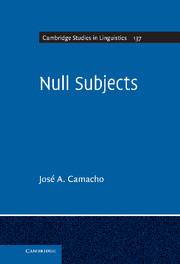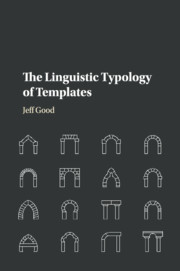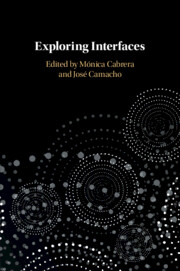Null Subjects
The null subject has always been central to linguistic theory, because it tells us a great deal about the underlying structure of language in the human brain, and about the interface between syntax and semantics. Null subjects exist in languages such as Italian, Chinese, Russian and Greek where the subject of a sentence can be tacitly implied, and is understood from the context. In this systematic overview of null subjects, José A. Camacho reviews the key notions of null subject analyses over the past thirty years and encompasses the most recent findings and developments. He examines a balance of data on a range of languages with null subjects and also explores how adults and children acquire the properties of null subjects. This book provides an accessible and original account of null subject phenomena, ideal for graduate students and academic researchers interested in syntax, semantics and language typology.
- Provides a balance of data, theoretical discussion and formalization, so readers will be able to obtain comprehensive data on a wide range of languages that have null subjects
- Proposes an original overall account of null subject phenomena
- Includes a discussion of data on L1 and L2 acquisition of null subjects and incorporates an overview of how children and adults acquire the properties of null subjects
Reviews & endorsements
"… the book is useful for anyone interested in further investigating the topic of NSs and NSLs. It provides a wealth of typological data for 'prototypical' NSLs and, especially, partial NSLs (less so for discourse NSLs) and provides a valuable summary of the current generative understanding of NSLs and the problems with many earlier (or widespread and influential) theories."
John Foreman, Linguist List
Product details
June 2013Hardback
9781107034105
268 pages
229 × 152 × 16 mm
0.41kg
53 b/w illus. 10 tables
Available
Table of Contents
- 1. Introduction
- Part I. What is the Null Subject Parameter? A Little History:
- 2. The null subject parameter: introduction
- 3. The core content of the NSP
- 4. The nature of the EPP and the null subject parameter
- Part II. On Identification:
- 5. Identification and morphology
- 6. Discourse identification
- 7. Null/overt subject contrasts
- 8. The status of preverbal subjects in NSLs
- 9. Parametrization, learnability and acquisition.







